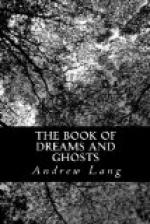“Here then the soul of a man is supposed to have had care for his son, and to have come to him in his sleep, that, teaching him what he did not know, he might relieve him of a great trouble. But about the very same time as we heard this, it chanced at Carthage that the rhetorician Eulogius, who had been my disciple in that art, being (as he himself, after our return to Africa, told us the story) in course of lecturing to his disciples on Cicero’s rhetorical books, as he looked over the portion of reading which he was to deliver on the following day, fell upon a certain passage, and not being able to understand it, was scarce able to sleep for the trouble of his mind: in which night, as he dreamed, I expounded to him that which he did not understand; nay, not I, but my likeness, while I was unconscious of the thing and far away beyond sea, it might be doing, or it might be dreaming, some other thing, and not in the least caring for his cares. In what way these things come about I know not; but in what way soever they come, why do we not believe it comes in the same way for a person in a dream to see a dead man, as it comes that he sees a living man? both, no doubt, neither knowing nor caring who dreams of their images, or where or when.
“Like dreams, moreover, are some visions of persons awake, who have had their senses troubled, such as phrenetic persons, or those who are mad in any way, for they, too, talk to themselves just as though they were speaking to people verily present, and as well with absent men as with present, whose images they perceive whether persons living or dead. But just as they who live are unconscious that they are seen of them and talk with them (for indeed they are not really themselves present, or themselves make speeches, but through troubled senses these persons are wrought upon by such like imaginary visions), just so they also who have departed this life, to persons thus affected appear as present while they be absent, and are themselves utterly unconscious whether any man sees them in regard of their image.” {18}
St. Augustine adds a similar story of a trance.
THE TWO CURMAS
A rustic named Curma, of Tullium, near Hippo, Augustine’s town, fell into a catalepsy. On reviving he said: “Run to the house of Curma the smith and see what is going on”. Curma the smith was found to have died just when the other Curma awoke. “I knew it,” said the invalid, “for I heard it said in that place whence I have returned that not I, Curma of the Curia, but Curma the smith, was wanted.” But Curma of the Curia saw living as well as dead people, among others Augustine, who, in his vision, baptised him at Hippo. Curma then, in the vision, went to Paradise, where he was told to go and be baptised. He said it had been done already, and was answered, “Go and be truly baptised, for that thou didst but see in vision”. So Augustine christened him, and later, hearing of the trance, asked him about it, when he repeated the tale already familiar to his neighbours. Augustine thinks it a mere dream, and apparently regards the death of Curma the smith as a casual coincidence. Un esprit fort, le Saint Augustin!




